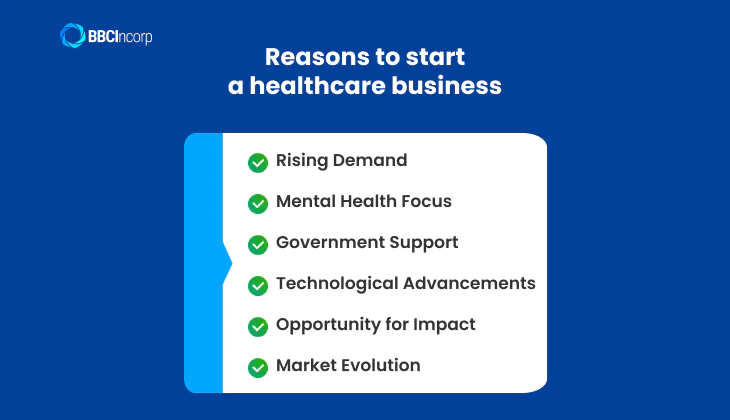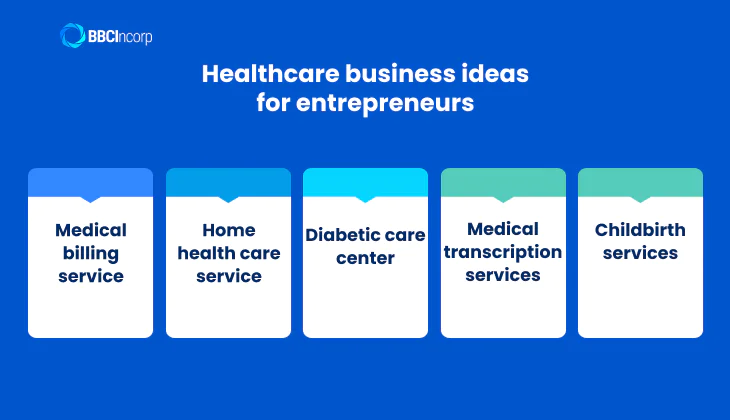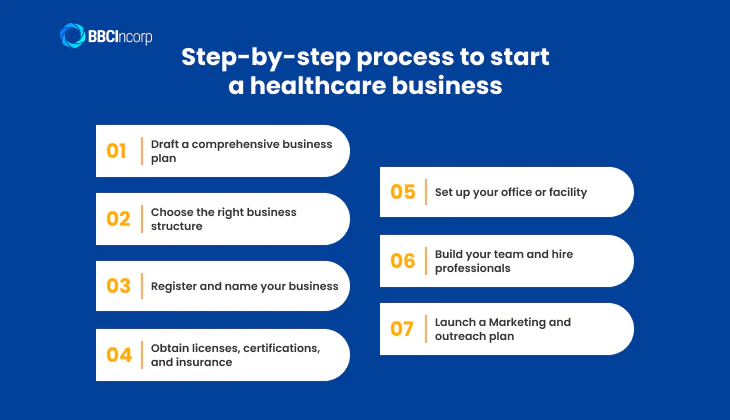
Table of Contents
The healthcare industry is experiencing significant growth, fueled by technological advancements and an increasing demand for accessible, personalized care. This expansion presents a wealth of opportunities for entrepreneurs eager to make a meaningful impact.
However, understanding how to start a healthcare business involves more than just a great idea; it requires meticulous planning, thorough market research, and strict adherence to regulatory standards.
In this guide, we’ll explore the essential steps to successfully launch a healthcare business, from selecting a niche to navigating legal requirements and securing funding. Whether you’re considering a tech-driven startup or a traditional healthcare service, this roadmap will equip you with the knowledge to embark on your entrepreneurial journey.
Understanding the healthcare industry landscape
The healthcare industry in 2025 is a dynamic and multifaceted sector encompassing a wide range of services, including clinics, home healthcare, diagnostic laboratories, and telemedicine platforms. This diversity offers numerous opportunities for entrepreneurs to innovate and meet the evolving needs of patients.
Several key trends are currently shaping the healthcare landscape. The aging global population is driving demand for long-term care solutions, such as home healthcare services, which are projected to grow at a compound annual growth rate (CAGR) of 10.21% from 2025 to 2030(1).
Simultaneously, digital transformation is revolutionizing the industry, with technologies like artificial intelligence (AI), Internet of Things (IoT) devices, and electronic medical records (EMRs) enhancing patient care and operational efficiency.
Additionally, personalized medicine is gaining traction, tailoring treatments to individual genetic profiles to improve outcomes
Healthcare ventures differ widely in their capital needs, regulations, and how they deliver services. For example, starting a telemedicine platform often requires a significant investment in technology and strict compliance with telehealth laws.
In contrast, running a home healthcare agency focuses more on meeting healthcare provider standards and hiring qualified staff. Knowing these differences is essential for entrepreneurs to successfully navigate the complex healthcare landscape.
Despite the promising opportunities, the healthcare industry faces challenges such as regulatory hurdles, data privacy concerns, and the need for continuous innovation. However, these challenges also present avenues for growth and improvement, making the healthcare sector an exciting field for entrepreneurial endeavors.
Why start a healthcare business now?
Launching a healthcare business presents a timely opportunity to address the escalating demand for medical services. Factors such as an aging population, the prevalence of chronic diseases, and a growing emphasis on mental health have intensified the need for accessible and affordable care.
Government initiatives are actively supporting this growth. For instance, the U.S. The Department of Health and Human Services offers grants through the Health Resources and Services Administration (HRSA) to enhance telehealth services, particularly in underserved regions.
Additionally, the Centers for Medicare & Medicaid Services (CMS) provides funding opportunities aimed at expanding healthcare access and improving service delivery.
The rapid expansion of telehealth and outpatient care further underscores the sector’s evolution. Advancements in digital health technologies, including AI-driven diagnostics and remote monitoring tools, are revolutionizing patient care and creating new avenues for innovation.
Moreover, the current landscape offers entrepreneurs the chance to make a meaningful impact. By addressing gaps in healthcare delivery and leveraging technological advancements, new ventures can contribute to improved patient outcomes and system efficiencies.
With the convergence of increased demand, supportive policies, and technological progress, now is an opportune moment to embark on a healthcare business journey.

5 Innovative healthcare business ideas for entrepreneurs
If you’re exploring how to start a medical business, consider these five innovative business ideas that align with current industry trends and demands.

Medical billing service
Establishing a medical billing service can be a lucrative venture. With the U.S. medical billing outsourcing market projected to reach $16.9 billion by 2033(2), growing at a CAGR of 12.5% from 2024 to 2033, there’s a significant demand for efficient billing solutions.
By offering specialized billing services, you can help healthcare providers streamline their revenue cycles and reduce administrative burdens.
Home health care service
The demand for home health care services is on the rise, driven by an aging population and the preference for in-home care. Starting a home health care business involves providing medical and non-medical services to patients in their homes, such as nursing care, physical therapy, and assistance with daily activities.
This venture requires adherence to healthcare regulations and the hiring of qualified healthcare professionals.
Diabetic care center
Establishing a diabetic care center addresses the growing need for specialized services for individuals managing diabetes. This business in hospital settings or standalone clinics offers comprehensive care, including education, monitoring, and treatment plans.
Starting a healthcare business in this area involves coordinating with healthcare professionals and investing in appropriate medical equipment.
Medical transcription services
Offering medical transcription services is essential for accurate documentation of patient interactions and treatment plans. With the rise of AI-driven tools, transcription services have become more efficient, aiding healthcare providers in maintaining comprehensive patient records. This business requires attention to detail and adherence to privacy regulations.
Childbirth services
Starting a business in childbirth services, such as prenatal education classes or doula services, caters to expectant mothers seeking personalized care. The demand for such services is growing, with opportunities to offer classes, workshops, and support groups. This venture allows you to support families during a pivotal life stage.
Each of these ideas presents unique opportunities for starting a healthcare business that aligns with current market demands and offers the potential for meaningful contributions to community health.
How to start a healthcare business
Starting a healthcare business in the U.S. offers significant opportunities due to the sector’s growth and innovation. However, it requires careful planning and adherence to regulations. Here’s a step-by-step guide to help you navigate the process.

Step 1: Draft a comprehensive business plan
A well-structured business plan is essential for securing funding and steering your healthcare business toward success. Start with clear mission and vision statements that define your purpose and long-term goals, emphasizing how your services will improve access, quality, or affordability.
Next, outline your scope of services—whether it’s urgent care, telehealth, in-home nursing, or diagnostics—and specify your target audience and the health issues you aim to address.
Conduct a market analysis to evaluate local demographics, competitor offerings, and service gaps. Use reliable data to validate demand.
Develop a pricing strategy that ensures competitiveness and sustainability, accounting for both patient payments and insurance reimbursements.
Include financial forecasts detailing:
- Startup and operating costs
- Revenue streams
- Break-even timeline
Conclude with a SWOT analysis to assess internal strengths and weaknesses, as well as external opportunities and threats. This helps you anticipate risks and plan accordingly.
Step 2: Choose the right business structure
Selecting the appropriate legal structure affects your taxes, liability, and operations. Common options include:
- LLC (Limited Liability Company): Offers simplicity and pass-through taxation, suitable for small to medium-sized businesses.
- Corporation: Ideal for larger operations or those seeking investment, providing limited liability and potential tax benefits.
- Sole Proprietorship or Partnership: Simpler structures for solo practitioners or small groups, though they offer less liability protection.
Obtain an Employer Identification Number (EIN) from the IRS, necessary for tax filings, opening bank accounts, and hiring employees. Be aware that some states require licensed medical professionals to be owners or directors of certain healthcare entities.
Step 3: Register and name your business
Officially registering your business and establishing a professional identity are vital steps. Choose a name that complies with state naming conventions and verify its availability through your state’s Secretary of State website.
If your operating name differs from your legal entity name, register a “Doing Business As” (DBA) name, which is beneficial for branding purposes.
Secure a matching domain name for your website and consider trademarking your business name and logo to protect your brand. File the necessary formation documents, such as Articles of Organization or Incorporation, with your state to complete the registration process.
Step 4: Obtain licenses, certifications, and insurance
Healthcare businesses are subject to extensive regulations. Licensing requirements vary by state and the type of services offered. For example, operating a home health agency or clinic may require specific state licenses.
Additionally, to bill Medicare, Medicaid, or private insurers, you must become a credentialed provider, which involves a detailed enrollment process. Depending on your services, you may need certifications such as CLIA for laboratories or DEA registration for handling controlled substances.
Insurance is essential to protect your business. Consider obtaining:
- Malpractice or Professional Liability Insurance: Protects against claims related to patient care.
- General Liability Insurance: Covers accidents, injuries, and property damage.
- Workers’ Compensation Insurance: Required if you have employees, covering work-related injuries.
- Cyber Liability Insurance: Important if you store patient data electronically, protecting against data breaches.
Step 5: Set up your office or facility
Your facility’s setup significantly impacts patient experience and operational efficiency. Decide on the type of location—physical, mobile, or virtual—based on your services and target market. Consider factors like proximity to hospitals, accessibility, and zoning regulations. When acquiring space, evaluate leasing terms, purchasing options, or co-working medical spaces.
Equip your facility with necessary items such as examination tables, personal protective equipment (PPE), computers, medical devices, and billing systems.
Implement Electronic Medical Records (EMR) or Electronic Health Records (EHR) software that complies with HIPAA regulations and suits your workflow. Ensure your facility meets the Americans with Disabilities Act (ADA) standards and adheres to infection control requirements.
Step 6: Build your team and hire professionals
Assembling a competent team is crucial for delivering quality care and managing operations. Hire licensed clinical staff appropriate to your services, such as doctors, nurses, therapists, and technicians. Your administrative team should include roles like front-desk personnel, medical billers, human resources, marketing, and compliance officers.
Consider partnering with credentialing services to expedite insurance approvals for your providers. Implement reliable payroll and human resources systems or consider outsourcing these functions to ensure compliance with labor laws.
Develop a structured hiring process, including writing clear job descriptions, advertising positions, conducting interviews, and verifying credentials and references.
Step 7: Launch a marketing and outreach plan
An effective marketing strategy is essential to attract and retain patients. Establish a strong digital presence by creating a professional website, claiming your Google Business Profile, and optimizing your site with healthcare-specific SEO content. Utilize social media platforms like Facebook and invest in Google Ads to target local patients effectively.
Build referral networks by partnering with physicians, hospitals, senior living communities, and employers. Encourage satisfied patients to leave online reviews and actively manage your online reputation by responding to feedback. Engage with the community through health screenings, webinars, or seminars to increase brand visibility and establish trust.
Compliance, legal requirements, and risk management
Ensuring compliance, understanding legal requirements, and implementing effective risk management strategies are critical for the success of any healthcare business.
Understanding regulations and standards
Healthcare businesses must adhere to various regulations to ensure patient safety and data security. Key among these is the Health Insurance Portability and Accountability Act (HIPAA), which mandates the protection of patient health information.
The HIPAA compliance checklist includes conducting regular risk assessments, implementing data encryption, and ensuring staff training on privacy policies.
Additionally, the Occupational Safety and Health Administration (OSHA) requires healthcare facilities to maintain safe working environments, with updated reporting requirements effective from January 1, 2024.
Compliance with the CMS regulations is also essential, particularly for facilities seeking reimbursement for services. Accreditation from organizations like The Joint Commission (JCAHO) and the Commission on Accreditation of Rehabilitation Facilities (CARF) can further demonstrate a commitment to quality and compliance
Insurance and risk mitigation
Securing appropriate medical business insurance is vital for mitigating risks. Malpractice insurance protects against claims of professional negligence, while general liability insurance covers incidents like patient injuries on the premises.
Given the increasing threat of cyberattacks, cyber liability insurance is also crucial; it covers expenses related to data breaches, including notification costs and legal fees. Engaging professional legal counsel to draft contracts and advise on compliance matters can further safeguard the business against potential legal issues.
Avoiding common mistakes
Common pitfalls in healthcare business compliance include improper billing practices, such as duplicate billing or incorrect coding, which can lead to audits and penalties.
Mismanagement of medical records, including inadequate data security measures, can result in HIPAA violations and substantial fines.
Noncompliance with privacy laws, often due to insufficient staff training or failure to conduct regular risk assessments, poses significant risks. Implementing comprehensive compliance programs, conducting regular audits, and fostering a culture of accountability are essential steps in effective risk management in healthcare business.
By prioritizing healthcare business compliance, securing appropriate insurance coverage, and proactively addressing potential risks, healthcare entrepreneurs can build resilient and trustworthy practices.
Simplify your healthcare business launch with BBCIncorp
Launching a healthcare business in the U.S. involves navigating complex regulatory landscapes, including selecting the appropriate legal structure, securing necessary licenses, managing tax obligations, and addressing potential international considerations.
These intricacies can be daunting for entrepreneurs eager to focus on patient care and service delivery.
BBCIncorp specializes in simplifying this process, offering comprehensive company formation for healthcare startups. With expertise in business registration across the U.S. and other jurisdictions — including:
- Company formation in Cayman Islands, BVI and Panama
BBCIncorp ensures that your healthcare business is established in compliance with all relevant regulations.
Our services extend beyond initial registration, providing ongoing compliance support, documentation assistance, and virtual office solutions to maintain your business’s professional presence.
Understanding the unique challenges faced by healthcare entrepreneurs, BBCIncorp tailors our services to meet the specific needs of the industry. Whether you’re starting a healthcare company with BBCIncorp or seeking a healthcare business registration service that offers speed, affordability, and regulatory readiness, their team is equipped to guide you through every step.
Get started with your healthcare business the smart way — explore our Company Formation Services and let BBCIncorp handle the paperwork while you focus on patient care and growth.
Conclusion
Starting a healthcare business may seem complex, but with the right steps, it becomes a rewarding and scalable venture. From developing a solid business plan and securing the proper licenses to ensuring full compliance and launching strategic marketing efforts, each stage plays a critical role in long-term success.
While the healthcare sector demands attention to detail, it also offers vast opportunities for growth and impact. If you’re wondering how to start a healthcare business, remember that strong preparation and the right partners make all the difference.
Ready to turn your vision into reality? Start your journey with expert support — let BBCIncorp simplify the process of starting a healthcare business so you can focus on delivering quality care and building your brand.
*References:
(1): https://www.grandviewresearch.com/industry-analysis/home-healthcare-industry
(2): https://www.globenewswire.com/news-release/2024/11/19/2983846/0/en/U-S-Medical-Billing-Outsourcing-Market-Is-Expected-To-Reach-Revenue-Of-USD-16-9-Bn-By-2033-At-12-5-CAGR-Dimension-Market-Research.html
Frequently Asked Questions
What is the easiest healthcare business to start?
Starting a medical billing service is often considered one of the easiest healthcare businesses to launch. It requires relatively low startup capital, can be operated remotely, and doesn’t necessitate medical credentials. With the increasing complexity of insurance claims and coding, healthcare providers often outsource billing tasks, creating a steady demand for these services.
Additionally, home healthcare services are accessible entry points, especially for those with a background in caregiving or nursing. These services cater to the growing aging population seeking in-home care options.
Which business is most profitable in the medical field?
Telemedicine stands out as one of the most profitable sectors in the medical field. The shift towards virtual consultations has reduced overhead costs for providers and increased access for patients.
Other lucrative areas include AI-driven diagnostics, which enhance early detection and treatment plans, and wearable health tech startups that offer continuous health monitoring solutions. These innovations not only improve patient outcomes but also present significant revenue opportunities.
What are the pros and cons of launching a healthcare startup
Pros:
- High Demand: An aging population and chronic disease prevalence ensure a consistent need for healthcare services.
- Innovation Opportunities: Advancements in technology allow for the development of novel solutions to longstanding healthcare challenges.
- Impactful Work: Healthcare startups have the potential to make meaningful differences in patient lives and community health.
Cons:
- Regulatory Hurdles: Navigating complex healthcare regulations can be time-consuming and requires specialized knowledge.
- High Entry Barriers: Significant capital investment and expertise are often necessary, especially for tech-intensive ventures.
- Data Security Concerns: Handling sensitive patient information mandates robust cybersecurity measures to prevent breaches.
What key performance metrics should healthcare startups track to measure success?
Healthcare startups should monitor several key performance indicators (KPIs) to assess and guide their growth:
- Patient Satisfaction Scores: Gauge the quality of care and service from the patient’s perspective.
- Readmission Rates: High rates may indicate issues with treatment efficacy or patient education.
- Average Length of Stay (ALOS): Helps in understanding operational efficiency and patient throughput.
- Revenue Cycle Metrics: Monitor billing efficiency, claim denials, and collection times to ensure financial health.
- Utilization Rates: Track how often services are used, aiding in resource allocation and identifying growth areas.
Regularly analyzing these metrics enables startups to make informed decisions, optimize operations, and enhance patient care quality.
Disclaimer: While BBCIncorp strives to make the information on this website as timely and accurate as possible, the information itself is for reference purposes only. You should not substitute the information provided in this article for competent legal advice. Feel free to contact BBCIncorp’s customer services for advice on your specific cases.
Industry News & Insights
Get helpful tips and info from our newsletter!
Stay in the know and be empowered with our strategic how-tos, resources, and guidelines.





